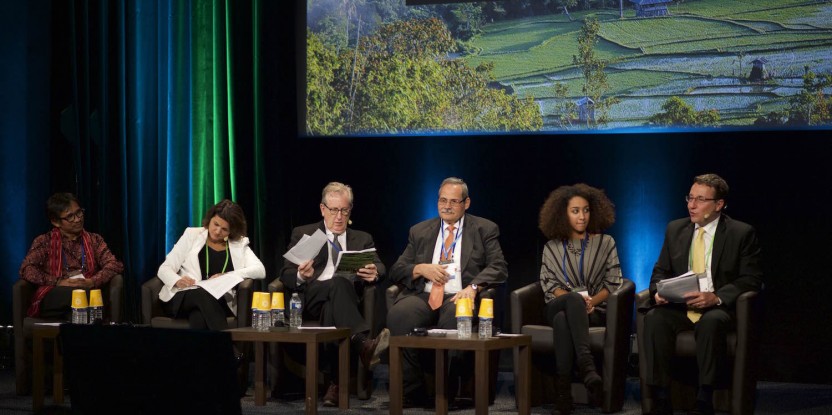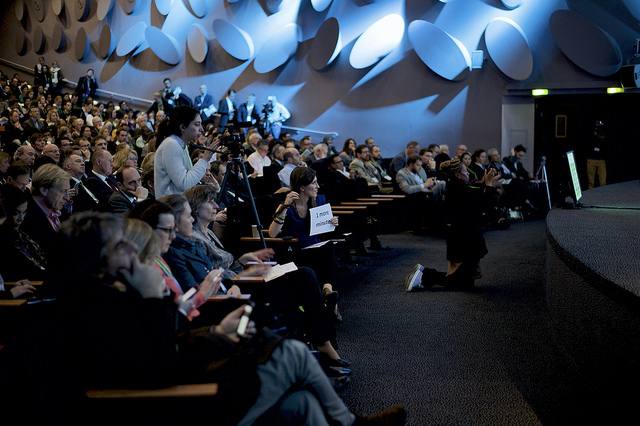
A holistic approach to sustainable land use adds an extra and important dimension to the global climate policy being shaped at COP21, speakers said at Sunday’s closing ceremony of the 2015 Global Landscapes Forum, held in Paris.
The Forum brought together more than 3000 people from across the forestry, agriculture, finance and other sectors, in both developed and emerging countries, to discuss the role of sustainable land use in achieving climate and development goals.
Achim Steiner, UNEP Executive Director and UN Under-Secretary-General, drew the connections between the two events with his reference to the global climate change conference underway outside Paris.
“The transitions that are being discussed a few kilometers down the road in Le Bourget are as yet very much focused on issues that relate to decarbonization, clean technologies,” he said.
“And despite our very best efforts, the ecological infrastructure of this planet, agriculture and forestry, as integral parts of being able and enabling the world to address this challenge, are not yet sufficiently recognized. In part, that is the task that the forum has taken on.”
Steiner welcomed the variety of interconnected topics discussed over the two days of the Forum, from restoration to supply chains to tenure and land rights, as a healthy way of facing the unavoidable complexity of the “places in which we manage resources and practice production”.
“In a world of 7 billion people, with all the resource pressures, demands, lack of public policy progress at local, national and international level on certain key things, complexity is becoming, if you want, the defining arena within which we need to move,” he said.
“There are a great deal of win-wins to be found in bringing the conversation about climate change, about food security, about farming, about forestry and about how we manage our ecosystems into a whole,” he added.
GREEN FINANCE
Finance, too, was high on the Forum’s agenda, with its opening session on Saturday focused on the investment needed for sustainable land use.
Mark Burrows, Managing Director and Vice Chairman for global investment banking at Credit Suisse, noted in the closing that “the most significant thing” to come out of COP21 so far was an announcement by China that it would put green finance on the agenda of its presidency of the G20 in 2016.
“This is the first new work stream that has come into the G20 for four years, and the Chinese will lead this with the People’s Bank of China and the Bank of England. That is enormously significant and it’s big news,” Burrows said.
Without the forests and the people who protect them, we will fail in our goal to save the planet from rapidly evolving climate change that puts humanity itself at risk.
Australian environment minister Greg Hunt, one of the high-level delegates from the 197 parties to the UN Framework Convention on Climate Change now arriving in Paris to hammer out a global climate agreement by the December 11 deadline, also referred to COP21 in his closing address.
“I really believe that by Friday of this week—maybe Sunday, maybe Saturday—there will be a Paris agreement at COP21,” he said.
FUTURE PERFECT
Beyond the summit’s outcome, Hunt turned to younger participants to the Forum and told them that the next steps in regulating climate would be in their hands, through initiatives such as the two he launched earlier that afternoon: one on global rainforest recovery, the other on the “blue carbon” potential of coastal ecosystems.
With tenure rights and the place of indigenous people also in the spotlight at many sessions throughout the two days, Abdon Nababan, representative of the International Indigenous Peoples’ Forum on Climate Change (IIPFCC), also made the connection with COP21.
While he said indigenous people were the best custodians of forests, he warned: “To continue to do this job, we need the world to recognize our rights as part of any agreement on climate change.”
Nababan added that scientists now saw the rights of indigenous people as an operational strategy to protect forests.
“Without the forests and the people who protect them, we will fail in our goal to save the planet from rapidly evolving climate change that puts humanity itself at risk,” he said.
He then asked the audience to pause and take a deep breath. Into the complete silence, he said: “Can you hear the Earth cry?”
We want you to share Forests News content, which is licensed under Creative Commons Attribution-NonCommercial-ShareAlike 4.0 International (CC BY-NC-SA 4.0). This means you are free to redistribute our material for non-commercial purposes. All we ask is that you give Forests News appropriate credit and link to the original Forests News content, indicate if changes were made, and distribute your contributions under the same Creative Commons license. You must notify Forests News if you repost, reprint or reuse our materials by contacting forestsnews@cifor-icraf.org.
